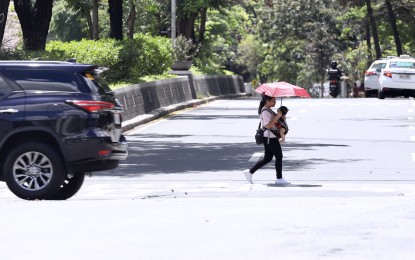
PROTECTED. A mother uses an umbrella to shield her toddler from the afternoon heat as they cross the intersection of Senator Miriam P. Defensor-Santiago and Quezon Avenues in Quezon City on Black Saturday (March 30, 2024). The heat index level in the city reached the "extreme caution" level of 38 to 39 degrees Celsius during the weekend. (PNA photo by Robert Oswald P. Alfiler)
MANILA – The Task Force El Niño on Monday urged local government units (LGUs) to consider suspension of in-person classes amid the possible effects of rising temperatures, especially on learners.
During the Bagong Pilipinas Ngayon briefing, Presidential Communications Office (PCO) Assistant Secretary and Task Force El Niño spokesperson Joey Villarama said LGUs can exercise their authority to suspend face-to-face (F2F) learning.
"Kung kayo po ay nakaka-experience ng extreme heat sa inyong lokalidad, nasa sa inyo po ang kapangyarihan po para i-shift ang inyong face-to-face classes to online classes (If you're experiencing extreme heat in your locality, the power to shift the face-to-face classes to online classes is in your hands)," he said.
Villarama stressed that LGUs should not only consider "convenience" but also the possible adverse effects of surging temperatures on learners and teachers.
"Kung hindi po talaga viable at hindi na po talagang advisable na tumungo pa sa mga classroom ang ating mga kabataan, pati ang ating mga teacher, ay mag-shift na po tayo sa (If it's no longer viable nor advisable for our youth to go to the classroom, even to our teachers, shift it to) online classes," he said.
At home, learners should also have access to adequate clean drinking water and stay in a well-ventilated area, he added.
Department of Education (DepEd) Assistant Secretary Francis Bringas, meanwhile, said learners and teachers have the option to wear more comfortable clothes inside school premises subject to dress codes.
The DepEd earlier mentioned that school heads also have the authority to declare class suspension, besides LGUs.
As of Monday, the DepEd reported 13 areas in four regions that suspended in-person classes from preschool to senior high school, both in public and private schools due to sweltering temperatures.
Dagupan City, Pangasinan in the Ilocos Region suspended F2F classes until April 4.
Other areas that suspended onsite classes on Monday were Iloilo City and Dumangas, Iloilo province; Roxas, Capiz; Kabankalan City, Silay City, Himamaylan City, and Bago City in Negros Occidental; and Guimaras in Western Visayas; as well as Pagadian City Pilot School and Buenavista Integrated School in Zamboanga Peninsula; and Banga and Tantangan in South Cotabato.
Preventing heat stroke
Meanwhile, former Health Secretary and House Deputy Majority Leader Janette Garin advised drinking water as soon as one feels thirsty to avoid conditions caused by the dry weather, like potentially fatal heat stroke.
"It’s so important that you carry a water bottle or water container. Do not wait for the time that you are thirsty that you have to drink water. Even with just a little desire to drink or if you feel that the heat is unbearable, drink water,” she said in a media briefing at the House of Representatives in Quezon City on Monday.
The Iloilo 1st District Representative warned that heat stroke may happen without the person even knowing it.
She emphasized the importance of ventilation, particularly between 10 a.m. and 2 p.m. when the heat is intense.
Coughs, colds, and fever may also happen due to hot weather.
The Department of Health also instructed moving to a cool or shaded place when experiencing intense heat to prevent heat stroke.
Applying cold compress to the armpits, groin, neck, and, back, or soaking in cold water, could also help. (with reports from Ma. Teresa Montemayor/PNA)
